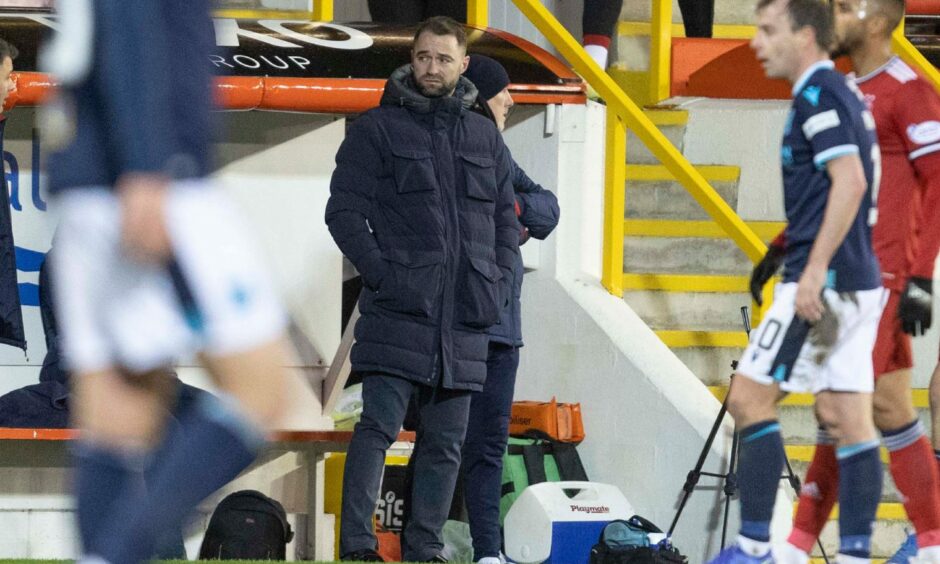The SPFL insist Dundee did not meet the criteria agreed with the clubs at the start of the season to for their trip to Aberdeen on Boxing Day to be postponed.
Dundee boss James McPake labelled the SPFL a disgrace after he was forced to travel to Pittodrie with 14 fit players, three of which were goalkeepers.
Such was the dearth of players available, Dark Blues assistant manager Dave Mackay registered himself as a player on the day of the game which Aberdeen won 2-1.
McPake, who made no changes to his side in the defeat, expressed his unhappiness at the game going ahead, citing health reasons after a positive Covid test for one player forced five in total to miss the trip to the Dons.
But SPFL company secretary and director of operations Calum Beattie insists the policy dictating whether games are postponed is clear.
He said: “The new SPFL board policy for postponing games due to Covid-19 cases was introduced at the start of the season specifically to deal with the circumstances we find ourselves in.
“Before finalising the new policy, we consulted with and listened to clubs carefully and incorporated specific elements such as the requirement to have a minimum of ten players aged 18 or over before matches could proceed.
“The SPFL board policy was notified to all 42 clubs before the season started and provides certainty and consistency on the criteria for postponements.
“The SPFL has repeatedly demonstrated that we will postpone matches when the criteria is met – with 10 league matches this season postponed already.”
Rules must be enforced consistently to ensure sporting integrity
Beattie says the league is sympathetic to the plight facing clubs but insists the rules cannot be changed midway through the campaign.
He said: “While we have enormous sympathies for any club which is unable to field its strongest team as a result of Covid-19, those calling for the policy to be changed midway through the season may not have considered the wider implications.
“Failure to administer the policy consistently could lead to clubs choosing not to fulfill specific fixtures, which would have massive implications for sporting fairness, increase pressure on other clubs and threaten the ability to complete the season.
“It is an essential cornerstone of the game that scheduled fixtures must be played when teams fulfil the necessary criteria.
“Failure to do so would undermine the integrity of the league, threaten completion of the season and would certainly cause far more problems than it would solve.
“Scottish football continues to operate in an extremely challenging and uncertain environment. This will undoubtedly mean that there are clubs most weeks who are struggling to fulfill fixtures.
“Already this season, we have seen many clubs complete fixtures with large numbers of players unavailable and we are grateful for the understanding and flexibility of those clubs, players and fans as they adapt to the challenges of Covid.
“If we are to complete the season as scheduled, clubs playing when their playing resources are stretched is, very regrettably, going to be a necessity.
“The health and safety of all involved is always a key consideration and the SPFL, when reviewing postponement requests, liaises closely with the Scottish FA, Joint Response Group (JRG) and Elite Sport Clinical Advisory Group (ESCAG) regarding any situations with multiple cases of Covid-19.”
SPFL Covid-19 postponement policy
The SPFL board policy, which was issued in July, states the following must apply for a request from a club to postpone a match due to Covid-19:
(I) Such request will be accommodated by the SPFL provided that the club has fewer than 13 available players to fulfil the fixture;
(II) Subject to (iii) and (iv) below, when calculating the number of players available, all
registered and eligible players over the age of 16 will be taken into account and clubs
have already been informed that all such persons need to be tested in accordance
with the SPFL’s Testing Regulations.
Any players out of self-isolation (regardless of the date of self-isolation ending) will be considered eligible to play and available to be listed on the Match Information Form;
(III) Of those minimum 13 players, at least one must be a goalkeeper and at least 11 must be outfield players; and
(IV) Of the minimum 13 players, at least 10 must be aged 18 years of age or over.

